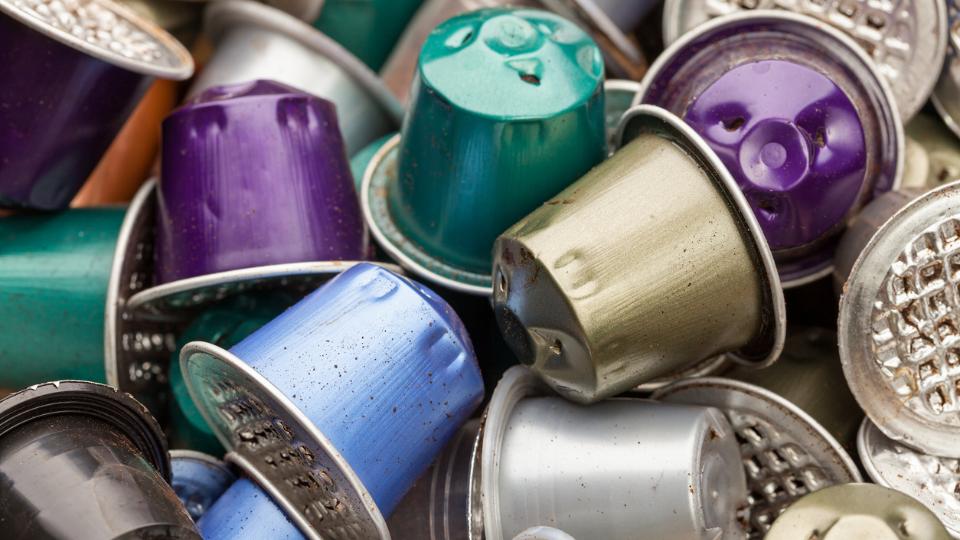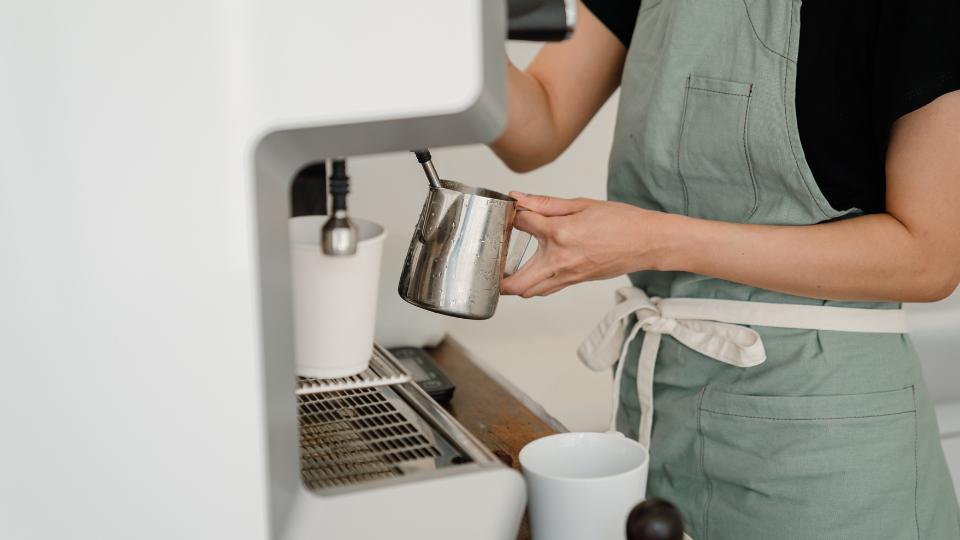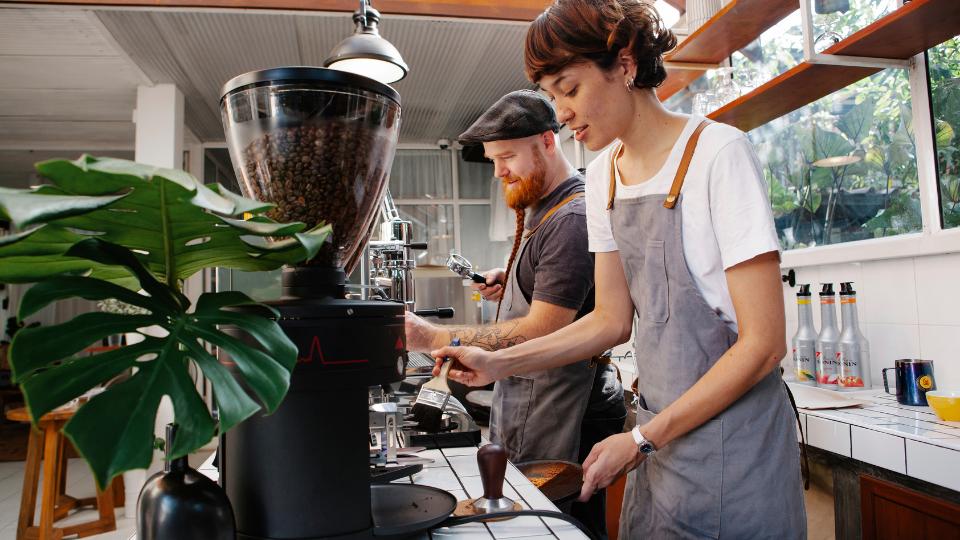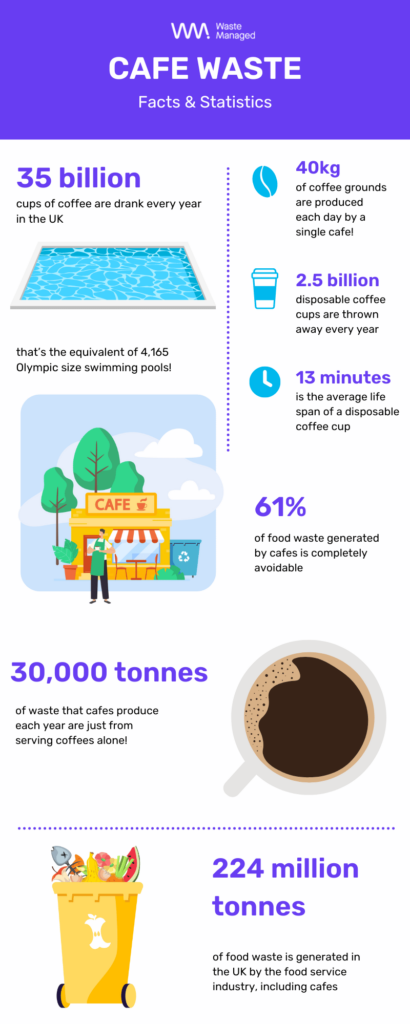
Running a cafe comes with its joys and challenges, but one aspect that often gets overlooked is managing commercial cafe waste.
In an era where environmental consciousness is at its peak, understanding how to handle cafe waste responsibly is not just good for the planet, but it’s also essential for the success and reputation of your business.
In this guide, we’ll walk you through everything you need to know about cafe waste, from its definition to regulations, disposal methods, and strategies for achieving zero waste.
Table of Contents
- What is Cafe Waste?
- The Impact of Cafe Waste
- Cafe Waste Management Strategies
- Cafe Waste Regulations in the UK
- Cafe Waste Disposal Methods
- Achieving Zero Waste in Your Cafe
- Interesting Facts and Statistics on Cafe Waste
- Conclusion

What is Cafe Waste?
Cafe waste includes anything that needs to be thrown away during the operation of your cafe.
This includes general waste, food waste, packaging and cardboard waste, dry mixed recycling, glass recycling and sanitary waste.
Doing a waste audit to ensure that you have the correct waste bins for your cafe is really important to make sure you stay legally compliant and your cafe is safe and enjoyable for customers.
Common Examples of Cafe Waste
Here are some of the most typical items that cafes tend to throw away:
- Disposable Coffee Cups & Lids
- Packaging Materials
- Napkins, Paper Towels & Blue Roll
- Plastic Utensils & Paper Straws
- Expired Ingredients
- Broken Items like Coffee Mugs
- Bakery Waste e.g. Expired Croissants or Muffins
Did You Know: There’s been a ban on single-use plastics introduced? Make sure you read more in our guide!

The Impact of Cafe Waste
Cafe waste is more than just discarded cups and leftovers; it poses significant environmental challenges that ripple through our ecosystems.
Every cup of coffee, pastry, or meal served in a cafe comes with a hidden environmental cost, from the resources consumed in production to the waste generated during consumption and disposal.
In the UK alone, cafes churn out tonnes of waste annually, contributing to the nation’s environmental footprint.
This waste finds its way into landfills, where it decomposes and releases harmful greenhouse gases like methane into the atmosphere, exacerbating climate change and polluting our air.
Money Saving Tip: Read more in our guide on landfill tax to make sure your business can avoid any penalties!
Beyond its direct environmental impact, cafe waste also has indirect consequences.
The resources expended in producing, packaging, and transporting food and beverages contribute to deforestation, habitat destruction, and biodiversity loss.
Did You Know? The hospitality industry produces an estimated 1 million tonnes of food waste each year!
By reducing waste, cafes can lower their operating costs, enhance efficiency, and improve their bottom line.
Adopting sustainable waste management practices can enhance brand reputation, attract environmentally conscious customers, and create a sense of social responsibility.
Read more in our blog on how to get closer to zero-waste with our helpful tips!

Cafe Waste Management Strategies
Effectively managing waste is essential for cafes to minimise their environmental impact and operate sustainably.
Implementing strategic waste management practices not only reduces waste sent to landfills but also helps cafes save on costs and enhance their reputation as responsible businesses.
In this section, we’ll explore practical strategies that cafes can adopt to tackle waste generation and promote sustainability throughout their operations.
1. Reduce
Reducing cafe waste starts with minimising waste generation at the source.
This can be achieved by:
- Menu Optimisation:
Design menus that minimise food waste by using ingredients efficiently and offering customisable options.
- Portion Control:
Serve appropriate portion sizes to reduce plate waste.
- Reusable Serveware:
Encourage the use of reusable cups, plates, and utensils to minimise single-use waste.
- Supplier Management:
Partner with suppliers who prioritise sustainable packaging and offer bulk options to reduce packaging waste.
2. Reuse
Promoting reuse within your cafe can significantly reduce waste.
Consider implementing the following strategies:
- BYOC (Bring Your Own Cup):
Offer discounts to customers who bring their own reusable cups.
- Compost Programmes:
Establish composting systems for organic waste, turning it into nutrient-rich compost for gardens or local farms.
- Creative Reuse:
Repurpose materials like coffee grounds for gardening or artwork.
3. Recycle
Implementing effective recycling programmes is essential for diverting waste from landfills.
Ensure that your cafe has designated bins for different types of recyclable materials, such as paper, plastic, glass, and metal.

Cafe Waste Regulations in the UK
In the UK, cafe waste management is subject to various regulations and guidelines aimed at promoting sustainable practices and reducing environmental impact.
Compliance with these regulations is crucial for cafes to operate responsibly and minimise their ecological footprint.
Here are some key regulations to be aware of:
1. Environmental Protection Act 1990
The Environmental Protection Act 1990 is one of the primary pieces of legislation governing waste management in the UK.
It sets out the legal framework for waste management and pollution control, including provisions related to waste disposal, recycling, and environmental protection.
Cafes must adhere to the requirements outlined in this act to ensure proper handling and disposal of their waste.
2. Waste (England and Wales) Regulations 2011
The Waste (England and Wales) Regulations 2011 build upon the Environmental Protection Act 1990 and provide specific guidance on waste management practices.
These regulations impose obligations on businesses, including cafes, regarding the segregation, storage, transportation, and disposal of waste.
Cafes must comply with these regulations to avoid penalties and ensure environmental responsibility.
3. Food Waste Regulations
Food waste is a significant concern in the hospitality sector, including cafes.
The UK government has introduced various initiatives and food waste regulations to address this issue, promoting waste prevention, reduction, and diversion from landfills.
One such initiative is the Waste and Resources Action Programme (WRAP), which works to support businesses in implementing food waste reduction strategies.
Cafes are encouraged to participate in programmes and initiatives aimed at minimising food waste and promoting sustainable food management practices.
4. Packaging Waste Regulations
Cafes often use packaging materials for serving food and beverages, which can contribute to waste generation.
The Packaging Waste Regulations impose obligations on businesses to recover and recycle packaging waste, including materials such as paper, plastic, glass, and metal.
Cafes must ensure compliance with these regulations by properly managing and disposing of packaging waste and participating in recycling schemes where applicable.
5. Duty of Care
Under the Duty of Care regulations, businesses, including cafes, have a legal obligation to ensure that their waste is handled, transported, and disposed of properly.
This includes taking steps to prevent waste, segregating different types of waste, and using authorised waste carriers and disposal facilities.
Failure to comply with the Duty of Care requirements can result in enforcement action and penalties.
By understanding and adhering to these regulations, cafes can effectively manage their waste, minimise environmental impact, and contribute to a more sustainable future.
Compliance with waste management legislation not only helps cafes avoid legal consequences but also demonstrates their commitment to environmental responsibility and social accountability.

Cafe Waste Disposal Methods
Effective waste disposal is essential for cafes to minimise their environmental impact and comply with waste management regulations.
Implementing proper waste disposal methods not only reduces the amount of waste sent to landfills but also promotes resource conservation and sustainability.
Here are three key waste disposal methods that cafes can use:
1. General Waste Collection
General waste collection involves disposing of non-recyclable and non-compostable waste through regular waste collection services.
This includes items such as plastic packaging, disposable utensils, and other materials that cannot be recycled or composted.
Cafes should ensure that waste is properly segregated and placed in designated bins for collection.
By using general waste collection services, cafes can prevent waste from accumulating on-site and contribute to proper waste management practices.
2. Recycling
Partnering with local recycling facilities is essential for cafes to ensure the proper recycling of materials such as paper, plastic, glass, and metal.
Recycling helps conserve natural resources, reduce energy consumption, and minimise the environmental impact of waste disposal.
Cafes should provide separate recycling bins for customers and staff to easily segregate recyclable materials.
Additionally, cafes can work with waste management companies or local authorities to arrange for regular collection and transportation of recyclable materials to recycling facilities.
By prioritising recycling efforts, cafes can divert a significant portion of their waste from landfills and contribute to a more sustainable waste management system.
3. Food Waste Collection
Food waste management is a critical aspect of running a sustainable cafe.
Proper disposal of food waste involves segregating non-edible or spoiled food items for disposal through regular waste collection services.
This includes food scraps, expired perishables, and unsellable food items that cannot be salvaged for donation or repurposing.
It’s essential to separate food waste from other types of waste to prevent contamination and facilitate efficient disposal.
By using food waste collection services, cafes can prevent the accumulation of organic waste on-site, which not only helps maintain cleanliness and hygiene but also contributes to responsible waste management practices.
Additionally, proper disposal of food waste reduces the likelihood of attracting pests and minimises unpleasant odours, creating a more pleasant environment for customers and staff alike.
4. Composting
Composting is a sustainable waste disposal method that involves the decomposition of organic waste into nutrient-rich compost.
Establishing on-site composting facilities or collaborating with composting facilities allows cafes to manage organic waste effectively.
Organic waste such as food scraps, coffee grounds, and biodegradable packaging can be collected separately and composted to produce compost that can be used to enrich soil and promote plant growth.
Cafes can also explore partnerships with local farmers or community gardens to donate compost or use it for landscaping purposes.
By composting organic waste, cafes can significantly reduce their environmental footprint, minimise greenhouse gas emissions, and support soil health and biodiversity.

Achieving Zero Waste in Your Cafe
Striving for zero waste is an ambitious yet attainable goal for cafe owners.
Here are some steps to work towards zero waste:
- Waste Audits:
Conduct regular waste audits to identify areas for improvement and track progress towards zero waste goals.
- Supplier Engagement:
Collaborate with suppliers committed to sustainable practices and minimal packaging.
- Customer Education:
Raise awareness among customers about the importance of waste reduction and encourage their participation in waste management efforts.
Want to find out more about going zero-waste? Read our guide for more tips!

Interesting Facts and Statistics on Cafe Waste
- The UK produces 30,000 tonnes of coffee cup waste each year.
- A single cafe can produce over 40 kilograms of coffee grounds per day, contributing significantly to food waste.
- Disposable cups and lids make up a substantial portion of cafe waste, with an estimated 2.5 billion cups thrown away each year in the UK.
- The average lifespan of a disposable coffee cup is just 13 minutes before it becomes waste.
- 920,000 tonnes of food waste are generated by restaurants and cafes every year
- 224 million tonnes of food waste are generated by the food service industry as a whole.
- 61% of the food waste generated by cafes is avoidable
- In the UK, 35 billion cups of coffee are drunk every year, that’s the equivalent of about 4,165 Olympic-size swimming pools just in coffee, every year!

Conclusion
Managing cafe waste effectively is not only a responsibility but also an opportunity for cafe owners to demonstrate their commitment to sustainability and the wider environment.
By implementing the strategies outlined in this guide and staying informed about regulations and best practices, you can minimise your cafe’s environmental footprint and contribute to a greener, more sustainable future for the UK.






